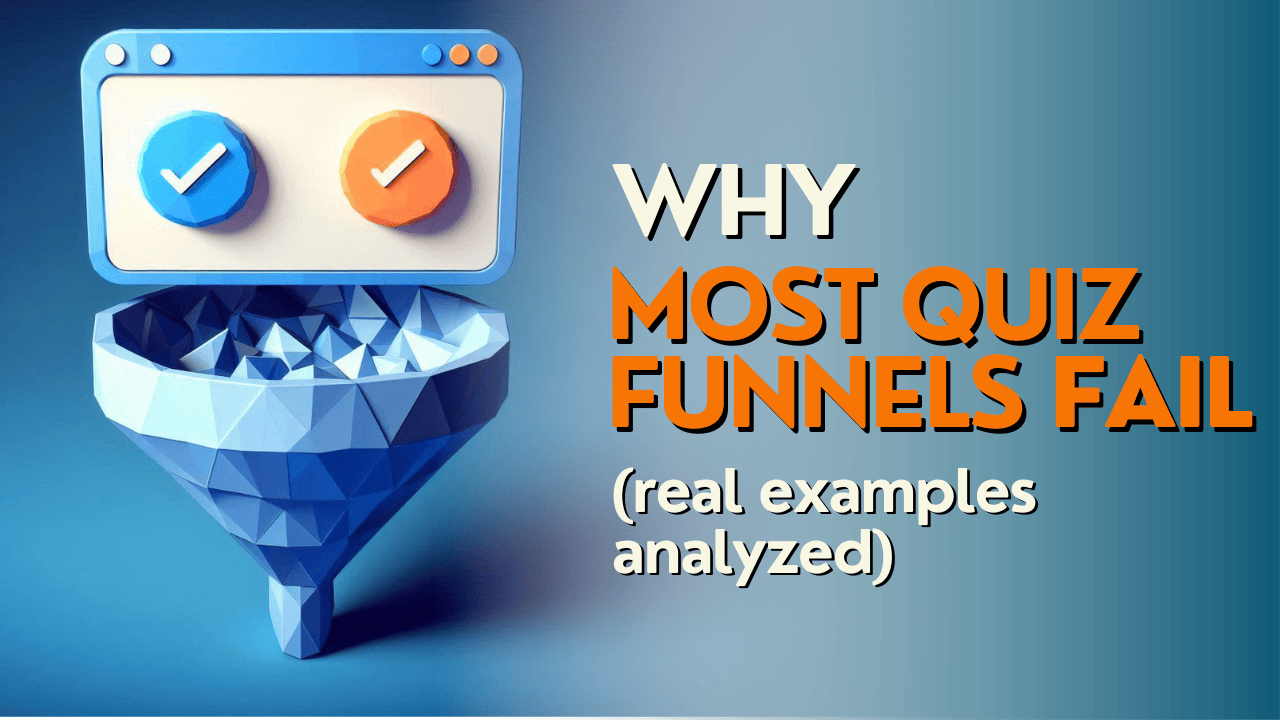Quiz funnels are everywhere.
Open Facebook, Instagram, or any major website and you’ll see them: “What’s Your Business Style?”, “Discover Your Skin Type”, “Find Your Perfect Diet Plan.”
They promise personalized insights in exchange for a few minutes of your time.
But here’s what most marketers don’t understand – the vast majority of these quizzes are conversion disasters waiting to happen.
Most quiz funnels follow the same broken formula: throw up an ad, drive traffic to a series of random questions, collect demographic data, then pitch a product.
The questions have no strategic purpose beyond lead qualification. Users start engaged but quickly lose interest as they realize they’re just filling out a glorified survey.
The result?
Terrible completion rates, weak conversions, and a lot of wasted ad spend chasing prospects who were curious but never became buyers.
The problem isn’t with quizzes themselves – it’s with how they’re built.
The best quiz funnels don’t just identify prospects; they transform them. They use strategically crafted questions to shift emotional states, moving people from casual browsers to solution-seekers who feel compelled to buy.
In this analysis, we’ll dissect 9 real quiz funnels from major brands across different industries.
You’ll see what works, what doesn’t, and why most quizzes fail to convert despite generating initial interest.
We’ll examine everything from a simple business assessment quiz to a sophisticated medical diagnostic tool, revealing the psychological patterns that separate high-converting quizzes from data-collection disasters.
But we won’t stop at analysis.
We’ll also show you exactly how to transform a broken quiz into a conversion machine by taking one of the worst offenders on our list and rebuilding it from scratch using a proven framework that creates buyers, not just leads.
1. Weight Loss Quiz Funnel Example – BetterMe
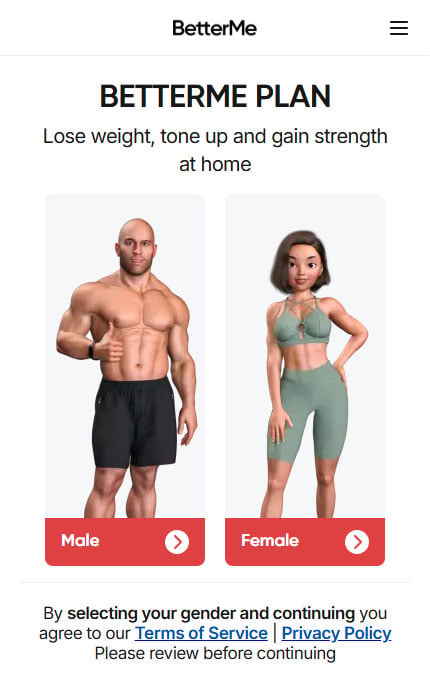
Looking at this BetterMe quiz, it’s quite comprehensive – maybe too comprehensive.
Click to see the full funnel in Figma
The Good:
- It’s visually engaging with body type images that help people visualize their goals
- They’re clearly trying to create a personalized experience with all the data they collect
- The wellness profile section at the end makes users feel like they’re getting a proper assessment
The Problems:
- It’s really long – by my count, there are 45+ questions spread across multiple pages
- Most questions feel like filling out a form at the doctor’s office rather than an engaging quiz experience
- There’s no real emotional hook that keeps you invested as you go through it
The User Experience:
The quiz starts strong with goal-setting questions, but then it becomes quite mechanical.
You’re answering things like “How much water do you drink?” and “Mark the vegetables you want to include” – which are necessary for meal planning but don’t really build excitement.
One smart move is asking about upcoming events – they recognize that people often get motivated to lose weight for vacations, weddings, reunions, etc.
And they actually use that event date to create a personalized timeline showing “We predict you’ll be 82 kg by August 15th – just in time for the Vacation.”
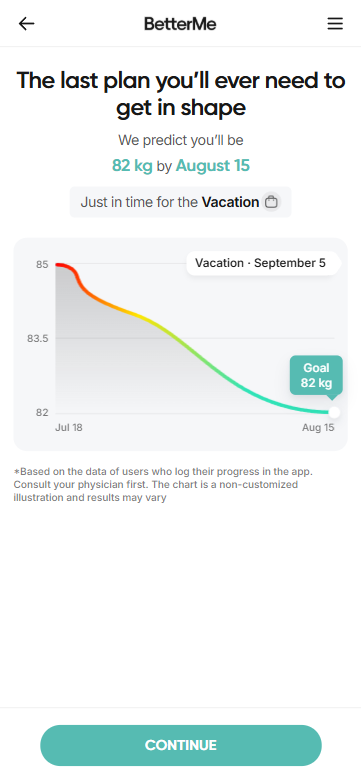
That’s clever because it makes the goal feel achievable and tied to something meaningful.
By the time you get to the end, you’ve invested so much time that you almost feel obligated to give your email just to see what you “earned.”
But there’s no real sense of urgency or desire built throughout the process.
The Missed Opportunity:
They do touch on emotional pain points toward the end – asking about falling back into old habits and making unhealthy choices after mistakes.
But these come too late in the process, and they don’t really make you feel the consequences of staying stuck.
It’s the kind of quiz that probably has decent completion rates initially because people are curious about their “personalized meal plan,” but I’d guess many users lose steam partway through because it feels more like work than discovery.
The quiz serves its purpose of data collection, but it doesn’t really transform how someone feels about their situation or create genuine excitement about the solution.
2. B2B Quiz Funnel Example – Red Clover
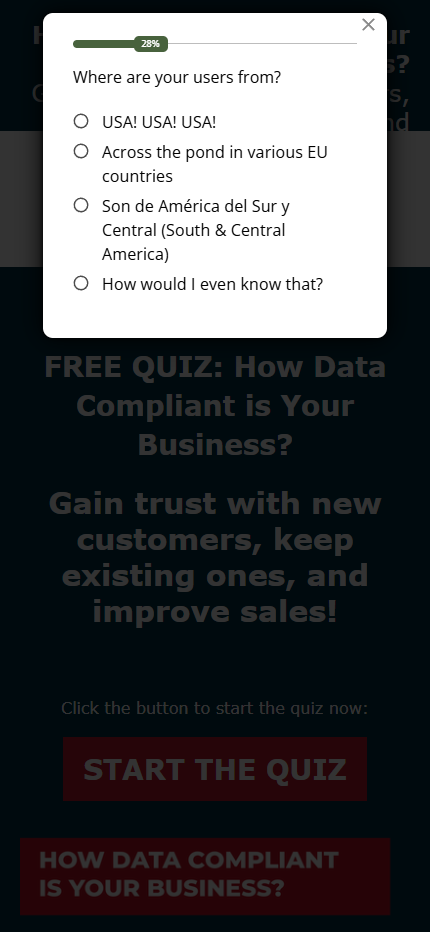
This Red Clover Advisors quiz is definitely entertaining – the humor is its strongest asset.
Click to see the full funnel in Figma
What Makes This Work
The humor is immediately apparent – “The kind that spend money,” “USA! USA! USA!” and “I use Google Maps for directions” as answers.
This makes what could be a dry, technical topic actually fun to engage with.
Self-Aware Audience Segmentation:
They clearly know their audience includes people who might be out of their depth (“I’m in marketing and that’s an IT job”) and they’re not afraid to call that out.
The recurring “I’m in marketing!” responses acknowledge many quiz-takers might not be the technical decision-maker.
Education Through Humor:
Each question teaches you something about data privacy while you’re answering it.
You learn about data mapping, individual rights requests, incident response plans.
The User Experience:
This feels more like a conversation with a witty consultant.
The humor keeps you engaged, but it’s also making you realize gaps in your knowledge without making you feel stupid about it.
Where It Falls Short:
While the quiz is entertaining, it doesn’t really make you feel the consequences of poor data privacy.
You might chuckle at “I use Google Maps for directions” but you’re not feeling the weight of what happens when your company gets breached.
No Progression:
The questions jump around topics without building toward anything. You’re learning, but there’s no escalating sense of urgency or problem awareness.
Weak Call to Action:
By the end, you might think “that was fun” but you’re not necessarily thinking “I need to call these people immediately.”
The Missed Opportunity:
They have all the ingredients for something powerful – they know their audience, they understand the pain points, and they have personality.
But they’re not using those elements to create genuine concern or desire for a solution.
It’s entertaining, but entertainment alone doesn’t drive conversions.
3. Coaching Quiz Funnel Example – Female Entrepreneur Association
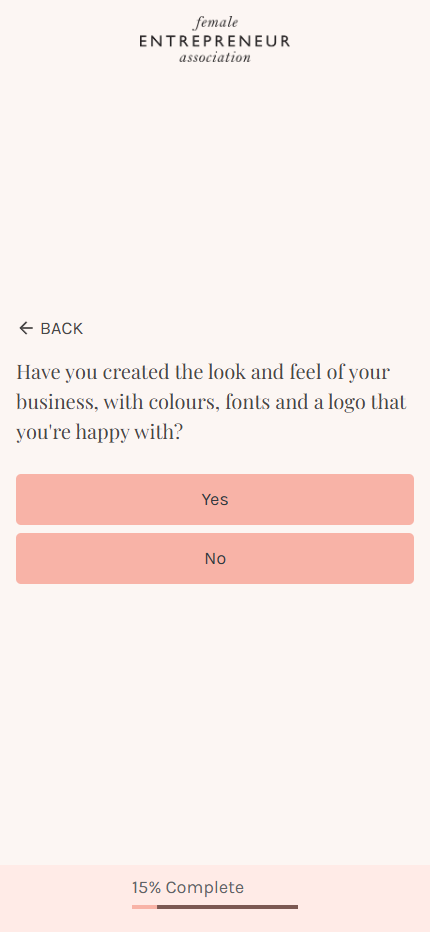
This Female Entrepreneur Association quiz is straightforward but has some significant issues that limit its effectiveness.
Click to see the full funnel in Figma
What They’re Doing:
Comprehensive Business Assessment:
They’re covering all the key areas – social media, email marketing, tech setup, customer identification, sales processes. It’s like a business audit checklist.
Simple Format:
The yes/no format makes it quick and easy to complete, which probably helps with completion rates.
Logical Flow:
The questions generally follow a business development sequence from idea to execution to income.
The Problems:
Every question is purely transactional – “Do you have an email list?” “Do you have a sales page?”
Aside from a few questions in the end, there’s nothing that makes you feel excited, worried, or motivated about your business journey.
Feels Like a Survey:
This reads more like a business assessment form than an engaging quiz. You’re just checking boxes about what you have or don’t have.
No Stakes:
The questions don’t help you understand why these things matter or what happens if you don’t have them. There’s no sense of urgency or consequence.
Missed Opportunity for Transformation:
They could be making entrepreneurs feel the gap between where they are and where they want to be, but instead they’re just cataloging current status.
The User Experience:
By question 10, you’re probably feeling either overwhelmed (if you answered “no” to most things) or bored (if you answered “yes” to most things).
Either way, you’re not feeling inspired or motivated to take action.
The quiz serves its purpose of segmenting users by business maturity level, but it doesn’t create any emotional investment in solving the problems it identifies.
What’s Missing:
There’s no journey here – no building excitement about possibilities, no recognition of struggles, no “aha” moments.
You finish knowing where you stand but not feeling compelled to change that position.
It’s functional but forgettable.
4. Finance Quiz Funnel Example – Find My Auto Finance
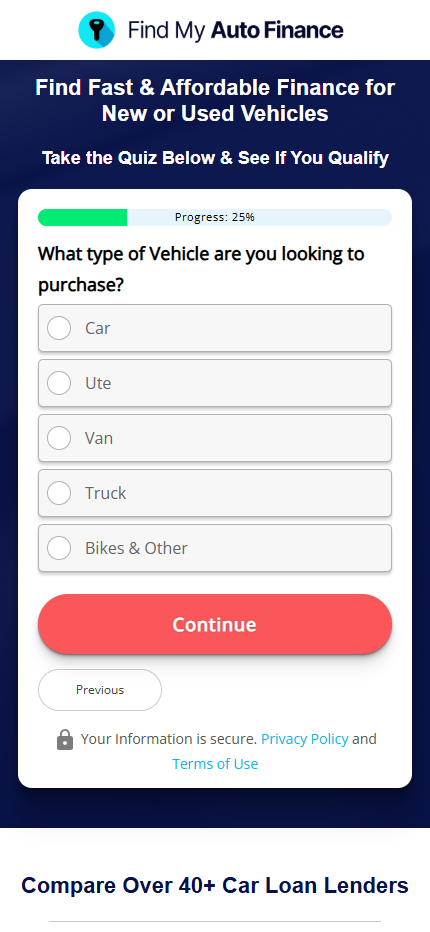
This car financing quiz is extremely basic – it’s essentially just a loan application form disguised as a quiz.
Click to see the full funnel in Figma
What They’re Doing
They’re collecting all the necessary information a lender would need – income, employment status, credit rating, loan amount. It’s efficient for their underwriting process.
Australian-Specific: They’ve tailored it properly for their market with citizenship status, DVA pension options, and postcode collection.
Clear Process: The flow is logical and ends with a clear “pre-qualified” message that sets expectations for next steps.
The Problems
Pure Data Collection:
Every single question is just gathering financial information. There’s absolutely nothing that engages emotions or creates desire for the service.
No Value Proposition:
They never explain why their financing might be better than going directly to a bank or dealer. No mention of competitive rates, faster approval, or easier process.
Zero Engagement:
This feels like filling out a bank form online. There’s no personality, no understanding of why someone might need car financing, no acknowledgment of common pain points.
Missed Emotional Opportunities:
They could be addressing the stress of car shopping, the excitement of getting a new vehicle, or the frustration of dealing with traditional lenders.
The User Experience:
You’re essentially just providing your financial details in exchange for… what exactly? A phone call from a broker? There’s no compelling reason to complete this beyond basic curiosity about qualification.
What’s Missing
No recognition that buying a car is often an emotional decision. No understanding that financing can be stressful or confusing. No positioning of their service as solving real problems.
It’s purely transactional – they want your data, you might get a loan. That’s not a compelling exchange in today’s market where people expect more value from their interactions with brands.
5. Skincare Quiz Funnel Example – Luvly
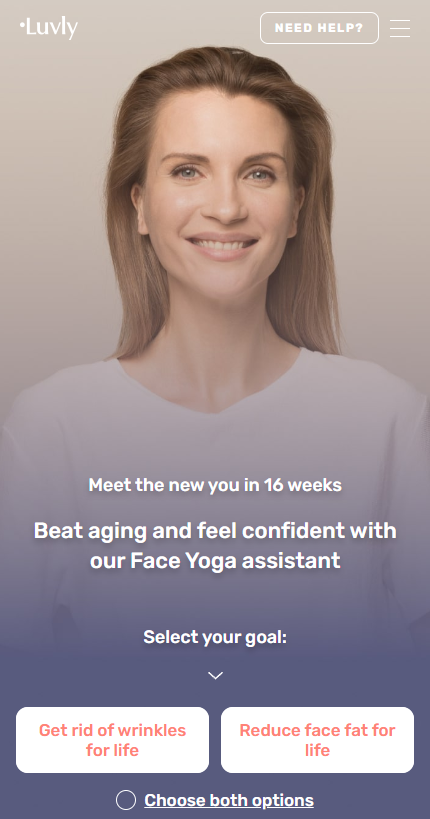
This quiz from Luvly is much more sophisticated than the previous ones – they’re clearly trying to create an emotional journey, but it’s still missing some key elements.
Click to see the full funnel in Figma
What They’re Doing Well:
They include several powerful psychological questions like “The reflection in the mirror affects my mood and self-esteem” and “I’m afraid that people won’t like me if I look older.”
These tap into real insecurities around aging and appearance.
Comprehensive Assessment:
They cover skincare routines, diet, lifestyle factors, and even mental health – showing they understand the holistic nature of skin health.
The psychological assessment questions are genuinely powerful.
When someone rates themselves a 5 on “I’m afraid people won’t like me if I look older,” that creates real emotional investment in finding a solution.
Social Proof and Authority:
They reference Harvard Medical School research, show expert credentials, and mention “273,908 women” using their program. This builds credibility.
Personalized Timeline:
Like the weight loss quiz, they give a specific date prediction – “Wrinkle-Free Skin by August 8” – which makes the goal feel achievable and concrete.
The Problems:
Mixed Messaging: The quiz jumps between functional emotional questions and basic data collection.
One moment you’re rating how much mirror reflections affect your self-esteem, the next you’re selecting skincare products from a checklist.
No Clear Emotional Progression:
While they have emotional elements, they’re scattered throughout rather than building systematically toward a crescendo of problem awareness.
Too Long:
This is a lengthy quiz that probably loses people along the way. There are 40+ questions covering everything from diet to menstrual cycles.
The User Experience:
The quiz starts strong with goal-setting and has good emotional moments, but it feels disjointed.
You’re answering deep psychological questions about aging fears, then suddenly being asked how many glasses of water you drink per day.
The informational slides break up the flow too much – by the time you get through all the education about face yoga and expert credentials, you’ve lost the emotional momentum.
What’s Missing:
A clear emotional arc that builds systematically rather than randomly inserting emotional questions between routine data collection.
The foundation for transformation is there, but it’s not structured optimally.
6. Medical Quiz Funnel Example – Nerva
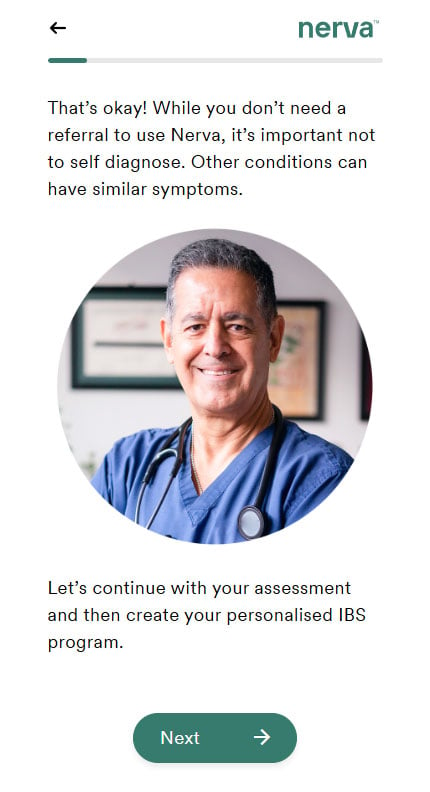
This is a quiz about IBS – a legitimate digestive disorder that affects millions of people.
Unlike weight loss or supplement quizzes that can get away with “creative claims”, this needs to maintain clinical credibility while still converting.
The stakes are higher for Nerva because they’re dealing with real medical symptoms and can’t make unsubstantiated health claims.
Click to see the full funnel in Figma
What They’re Doing:
They open with legitimate credentials (Dr. Simone Peters, Monash University clinical trial) and maintain clinical language throughout.
This creates a safe space for people to admit embarrassing symptoms and failed treatments without feeling judged.
Systematic Problem Building: They don’t just ask about symptoms – they create a comprehensive picture of suffering:
- Physical symptoms (bloating, pain, diarrhea)
- Frequency and duration (daily symptoms for years)
- Life impact (can’t socialize, nervous about travel)
- Financial costs (doctor visits, missed work, ineffective treatments)
- Failed solutions (medication, diets, supplements that didn’t work)
Educational Seduction: Rather than just collecting data, they teach throughout the quiz.
The gut-brain connection explanation feels like valuable information, not a sales pitch. They’re positioning themselves as educators first, sellers second.
Future State Visualization: They systematically move from current problems to future possibilities:
- “Imagine yourself in 6 weeks time, how would you like to feel?”
- “What would you want to do if you were free from the control of IBS?”
- “Describe a daily activity that will become easy again?”
Personalized Outcome Prediction: The specific date (“Wednesday, August 20th 2025”) based on “58,000 similar members” creates concrete hope rather than vague promises.
This isn’t just “results in 4-6 weeks” – it’s a personalized timeline that feels scientifically calculated.
Commitment Escalation: They gradually increase psychological investment:
- Time commitment questions (15 minutes daily)
- Consistency questions (5+ days per week)
- Support preferences (coaching, reminders, community)
- Post-success planning (what you’ll do after achieving results)
Social Proof Integration: Testimonials and statistics aren’t dumped at the end – they’re woven throughout as natural validation points when introducing new concepts.
Choice Architecture: From payment options ($1 vs $12 trial) to support preferences, they create a sense of control while guiding toward their preferred outcomes.
The Real Problems:
Despite the sophisticated emotional arc, most individual questions remain clinical and detached.
They use passive, third-person language (“Do you experience symptoms?”, “Have you been diagnosed with?”) instead of first-person ownership that creates emotional investment.
Compare their approach:
- “How often do you experience IBS symptoms?” (clinical, detached)
- “What physical symptoms do you normally experience?” (observational)
Versus functional alternatives:
- “I find myself constantly worried about when my next flare-up will hit” (personal, emotional)
- “I’ve had to cancel social plans because I’m afraid of having symptoms in public” (consequence-focused)
No Emotional Escalation in Question Format:
While the overall quiz builds problem awareness, individual questions don’t intensify emotional states.
They maintain the same clinical tone throughout instead of gradually shifting from neutral to problem-aware to solution-seeking.
Missed Opportunity for Identity Shift:
The questions identify what someone HAS (symptoms, triggers, failed treatments) but don’t help them feel who they’re BECOMING.
There’s no transition from “IBS patient” identity to “person taking control of their health” identity.
Safe but Sterile:
The medical legitimacy comes at the cost of emotional engagement.
They’re so focused on avoiding health claims that they don’t help people feel the true weight of their situation or the excitement of potential relief.
No Pressure Building:
Unlike effective quiz funnels that create urgency through problem amplification, this quiz stays comfortable.
People finish informed but not compelled – they understand their situation better but don’t feel the emotional pressure to change it immediately.
Functional Question Void:
The framework calls for questions that transform emotional states, but Nerva’s questions primarily collect information.
They’re comprehensive but not transformative. Overall best quiz so far.
7. BizOp Quiz Funnel Example – Ramit Sethi
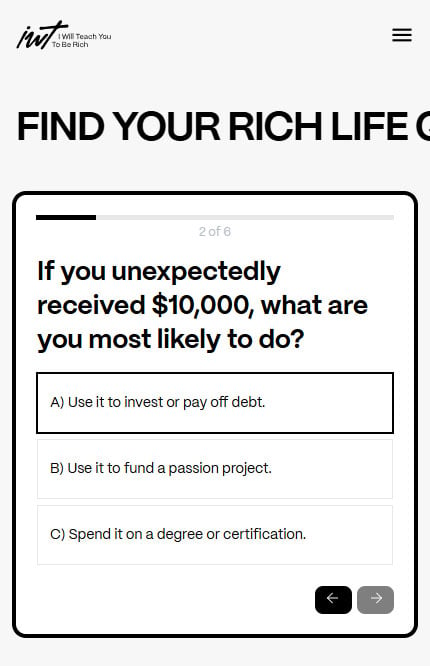
This quiz from Ramit Sethi (I Will Teach You To Be Rich) is interesting because it attempts to balance aspiration with practicality, but it has some significant structural issues.
Click to see the full funnel in Figma
What They’re Doing
They’re targeting people who want more than just financial advice – they’re selling a “Rich Life” philosophy that goes beyond money to include freedom, passion, and personal fulfillment.
Values-Based Segmentation:
Rather than just asking about income or age, they’re identifying what people actually value – learning style, life vision, spending priorities. This creates better product-market fit than demographic data.
Aspirational Language:
Questions like “When you envision a Rich Life” and the vacation question tap into desires rather than just current circumstances. They’re selling the dream, not just the solution.
Multi-Dimensional Assessment:
They cover learning preferences, life goals, financial stress, and personal values – giving them multiple angles to customize their approach.
The Problems
The quiz stays at the same aspirational temperature throughout. There’s no journey from positive to problem-aware to solution-seeking.
It’s all “what do you want” without ever making you feel what you’re missing.
Missing Problem Amplification:
They touch on money stress in question 4, but they don’t make you feel the weight of that stress. “Living paycheck to paycheck” is mentioned casually rather than explored emotionally.
Weak Functional Questions:
Most questions are still identifier-based rather than transformational. “What’s your biggest money stress?” vs. “I lie awake at night worried about money because…”
The User Experience
You finish feeling somewhat hopeful about your “Rich Life” but not urgently compelled to change your current situation. The quiz confirms what you already want but doesn’t create the emotional pressure to act on those wants.
The email capture happens before results, which works for a known brand like Ramit but creates friction without first delivering value.
What’s Missing
They ask about dreams but don’t help you feel the gap between those dreams and your current reality. No “I’m frustrated that I can’t afford the lifestyle I want” moments.
The quiz succeeds as a lead magnet for people already interested in financial improvement, but it doesn’t transform casual browsers into motivated buyers.
It’s aspirational without being transformational.
8. Personality Quiz Funnel Example – Neil Gordon
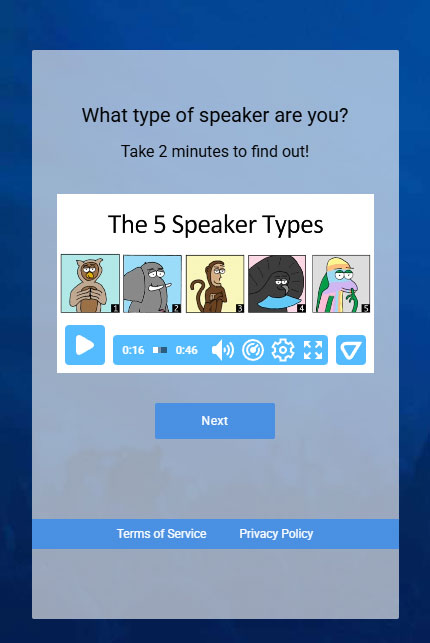
This quiz from Neil Gordon is surprisingly sophisticated and gets several things right that most quizzes miss completely.
Click to see the full funnel in Figma
What They’re Doing
Instead of boring demographic questions, they’re using scenario-based questions that feel like personality tests. “When you were in high school” and “After seeing a terrible Broadway show” are infinitely more engaging than “What’s your age?”
Behavioral Assessment Through Stories:
Each question presents relatable scenarios and asks how you’d respond. This creates genuine self-reflection rather than surface-level data collection. People actually think about their answers.
Clever Indirect Approach:
Rather than asking “Are you a good speaker?” they assess speaking style through personality traits and social behaviors. Much more accurate and less threatening.
Identity-Based Results: Getting labeled as an “OWL” speaker type creates identity investment. People want to know what that means and how to leverage it.
Natural Question Flow: The progression from high school behavior to conflict resolution to storytelling style feels conversational, not interrogational.
The Problems
While engaging, the quiz doesn’t create problem awareness or solution desire.
It’s all assessment without transformation – you finish knowing your type but not feeling compelled to improve your speaking.At least not while you are taking the quiz.
Because the result video was not available I am not sure how they’ve integrated all the information that was gathered.
The User Experience
This quiz succeeds where most fail – it’s actually fun to take.
The scenarios are creative and relatable, making you think “Oh, I’d totally do that!” The personality test format keeps you engaged throughout.
However, you finish entertained but not necessarily motivated. It’s like taking a BuzzFeed quiz – interesting but not compelling.
Based on the comments from people who’ve taken the quiz, they found it fun and valuable.


However, since the quiz is no longer running, I guess it didn’t convert well, despite the engagement.
9. Supplement Quiz Funnel Example – ColonBroom
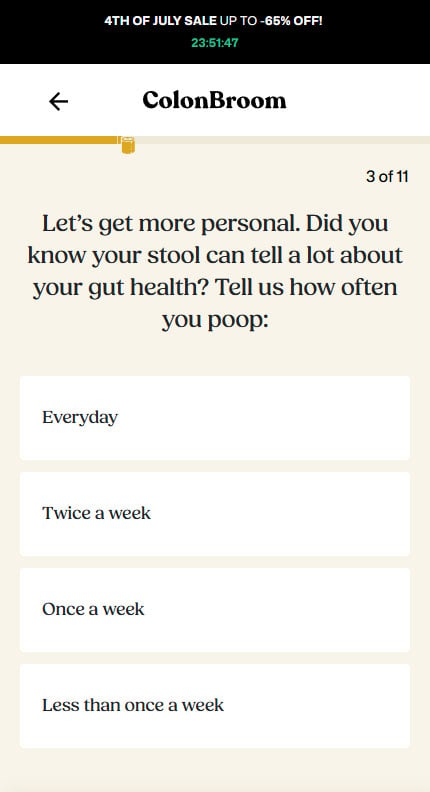
ColonBroom is a supplement company selling a gut health product. Their quiz targets people with digestive problems.
It’s 11 questions about bowel movements, bloating, weight issues, and other gut-related symptoms that are making people feel like crap.
Click to see the full funnel in Figma
What They Did REALLY Well:
Personality & Voice: Most health quizzes are sterile and boring. They created a conversational tone that make people smile.
Engagement Factor: Questions like “Did you know your stool can tell a lot about your gut health?” are bold and attention-grabbing. They aren’t afraid to be direct about uncomfortable topics.
Logical Flow: The progression from general health → specific symptoms → safety considerations → customization makes perfect sense from a product perspective.
Conversational Tone: “Keep going! You’re doing amazing” – they understand the importance of encouragement and momentum.
What’s Missing
❌ Emotional Flatline
Every single question was informational.
No identity building, no problem escalation, no desire creation. It was like having a funny conversation with a doctor instead of a transformation journey.
❌ No Psychological Momentum
They started neutral and stayed neutral. High-converting quizzes start positive to build momentum, then escalate problems to create urgency.
❌ Product-Centric vs. Customer-Centric
Questions focused on “what ColonBroom needs to know” rather than “what emotional journey will make them desperately want a solution.”
❌ No Pain Escalation
They listed symptoms but never made people feel the impact of those symptoms on their life, confidence, or future.
Results Page
This results page is a massive missed opportunity that’s probably costing 30-40% of potential conversions.
What’s Actually Good:
- Clean Design: Visually appealing and professional
- Social Proof: Expert approval and head of nutrition adds credibility
- Ingredient Focus: Smart to highlight the science-backed components
- Promise Section: Addresses common objections about results
Major Conversion Killers:
Zero Emotional Connection: This reads like a generic product page, not a personalized transformation plan. Where’s the urgency from the quiz journey?
Weak Personalization: “Male, 32, 180cm, 84kg” That’s not personalization, that’s just parroting back what they entered. My calculator could do this.
No Problem Reinforcement: After building all that problem awareness in the quiz, the results page completely drops the emotional thread.
Generic Benefits: “Endless benefits” could be copy-pasted for any supplement. Where’s the specific solution to THEIR specific concerns?
The Psychology They Missed:
The results page should be the emotional climax where all the quiz tension gets resolved.
Missing Elements:
- No reference to their specific quiz answers
- No escalation of their particular problems
- No “this is why other solutions failed you”
- No urgency or scarcity
- No emotional payoff from the journey
The quiz was like a really entertaining product brochure when it could have been a psychological sales presentation.
The personality was there, but the persuasion psychology wasn’t.
What Makes a Good Quiz Funnel
After analyzing these quizzes, you might be wondering – what separates the high-converting ones from the mediocre ones?
Why do some quizzes feel engaging while others feel like boring surveys?
The answer lies in understanding that most quiz funnels are built backwards.
They focus on collecting information about prospects rather than transforming how prospects feel about their situation.
This is why completion rates are often terrible and conversions are weak.
The framework we’ve been evaluating against takes a completely different approach.
Instead of just identifying customers through basic demographic questions, it focuses on creating customers by systematically shifting their emotional state throughout the quiz experience.
The key breakthrough is using “functional questions” – questions that serve a psychological function rather than just collecting data.
Instead of asking “How old are you?” you ask “This year, I’m…” with emotionally charged answer choices that make people feel something about their age and situation.
The optimal quiz structure follows a specific emotional arc:
- Start Positive: Use “towards” language (I want to, I hope to) to create momentum and engagement
- Move to Neutral: Transition with behavior-based questions (I tend to, Sometimes I)
- End Negative: Use problem-aware language (I struggle with, I’m afraid that) to create ownership of the problem
- Pressure Release: Finish with choice-based questions that direct to personalized solutions
This transforms prospects from an “information-seeking state” through a “problem state” and finally to a “solution state” where they’re primed to buy.
Most quizzes skip the crucial problem state phase, which hurts conversions despite the initial interest.
The goal is psychological transformation – by the end, prospects should feel they’ve admitted to having a problem they can’t solve alone, creating genuine buying intent rather than just curiosity.
This evaluation framework is based on extensive research into high-converting quiz psychology and is outside the scope of this article.
For the complete guide with detailed examples and implementation strategies, visit our Ultimate Guide to Creating High-Converting Quiz Funnels.
Applying the Psychology Quiz Funnel Framework in Real Time
Now that we understand what makes a quiz funnel truly effective, let’s put this framework into practice.
We’re going to take one of the quizzes we analyzed and completely transform it using functional questions and proper emotional progression.
We’ve chosen ColonBroom for this transformation because they represent the biggest missed opportunity on our list.
Their current quiz is purely transactional – a series of demographic and lifestyle questions that collect data without creating any emotional investment.
This makes ColonBroom the perfect candidate for transformation.
We’ll take their existing quiz structure and rebuild it using functional questions that move prospects from information-seeking to problem-aware to solution-seeking.
You’ll see how the same basic information can be gathered while simultaneously creating genuine buying intent through psychological transformation.
Positive Questions (Identity-Based – Build Momentum)
1. This year, I’m someone who…
- A) Is finally ready to prioritize my health and feel amazing
- B) Deserves to wake up energized and confident in my body
- C) Is committed to taking control of my wellness journey
Psychology: Creates positive identity association and momentum
2. When it comes to my health goals, I am…
- A) Determined to find what actually works for my body
- B) Ready to invest in premium solutions that deliver results
- C) Focused on creating lasting change, not quick fixes
Psychology: Reinforces commitment and primes for premium positioning
3. I believe my body is…
- A) Capable of incredible transformation with the right support
- B) Deserving of the best ingredients and premium care
- C) Ready to function at its optimal level
Psychology: Builds self-efficacy and justifies premium investment
Neutral Questions (Behavior-Based – Transition Thinking)
4. Help us understand your body’s current patterns – how often do you have bowel movements?
- A) Daily or more
- B) Every 2-3 days
- C) Once a week or less
Psychology: Clinical info gathered while still engaged, not emotionally peaked
5. These symptoms might be connected to your gut health – which ones sound familiar?
- A) Bloating, gas, or digestive discomfort
- B) Skin issues (acne, eczema, rashes)
- C) Low energy, mood changes, or brain fog
- D) Weight struggles or cravings
- E) None of these
Psychology: Educational framing – “might be connected”
6. For your safety, do you have any of these conditions or take medications?
- A) Diabetes or blood sugar medications
- B) Thyroid disorders or medications
- C) Digestive diseases (IBS, GERD, Crohn’s, etc.)
- D) Blood thinners or heart medications
- E) None of the above
Psychology: “For your safety” – benefit framing while gathering essential medical info
7. Any allergies or sensitivities we should know about?
- A) Wheat/gluten or lactose
- B) Nuts, fish, or shellfish
- C) Citrus fruits or berries
- D) None of the above
Psychology: “We should know about” – care positioning
Negative Questions (Problem-Aware – Create Urgency)
*Personalized Based on Previous Answers
8. I’m frustrated because I… (Based on answers from Q4-Q7)
Example A: If they selected digestive symptoms + infrequent bowel movements:
- A) Feel bloated and backed up more days than not
- B) Have tried fiber supplements that just made things worse
- C) Know this is affecting my confidence and daily comfort
Example B: If they selected skin issues + digestive problems:
- A) Feel like my skin problems are connected to my gut but don’t know how to fix both
- B) Have spent money on skincare that doesn’t address the root cause
- C) Am tired of people commenting on my skin when I feel bad enough already
Example C: If they selected weight struggles + mood issues:
- A) Feel like my gut issues are sabotaging my weight loss efforts
- B) Notice my mood crashes when my digestive system is off
- C) Can’t seem to lose weight no matter what I eat
Psychology: Hyper-personalized frustration based on their specific symptom combination
9. I’m concerned that… (Based on answers from Q4-Q7)
Example A: If they have medical conditions + symptoms:
- A) My digestive issues are making my other health problems worse
- B) My medications might be affecting my gut health
- C) I’m stuck in a cycle where nothing seems to help
Example B: If they have multiple symptoms:
- A) All these issues are connected and I’m only treating symptoms, not the cause
- B) This is getting worse over time instead of better
- C) I’m missing something important about my health
Psychology: Escalates concern specific to their situation
10. My biggest fear is that…
Example A: If they have severe constipation + other symptoms:
- A) I’ll never have normal, comfortable bowel movements
- B) This is causing long-term damage to my body
- C) I’ll have to live with this discomfort forever
Example B: If they have multiple interconnected symptoms:
- A) I’ll never find a solution that addresses all of these connected issues
- B) This will continue to impact every area of my life
- C) I’m running out of options and time
Psychology: Peak problem awareness tailored to their specific fears
Pressure-Release Question (Choice & Direction)
11. What would you like instead?
- A) A premium, comprehensive solution that addresses all my concerns
- B) To finally feel light, energized, and confident in my body
- C) A proven system that delivers lasting results, not temporary fixes
Psychology: Releases pressure while directing toward solution
Practical Questions (Reframed for Safety/Customization)
12. To ensure ColonBroom Premium is perfect for your body, please share any sensitivities:
- Wheat and gluten
- Lactose intolerance
- Nuts
- Fish/Seafood
- Citrus fruits
- None of the above
- Other
Psychology: Positions as personalization, not interrogation
13. Help us customize your perfect experience – share your details:
- Age: [dropdown]
- Height: [input]
- Current weight: [input]
- Goal weight: [input]
- Activity level: [Very Active / Moderately Active / Lightly Active / Sedentary]
Psychology: Framed as customization benefit, not data collection
This structure creates much stronger emotional resonance because people think “Holy shit, this quiz understands MY exact situation” instead of “This is generic gut health stuff.”
ColonBroom Quiz Comparison: Old vs New
To put it in perspective let’s compare the old and the new version to see just how different it is.
| Data Being Collected | Original Questions | New Questions |
| General Health State | Q1: “Please share your current health state:” (Poor/Could be better/Average/Pretty good/Feeling great) | No direct equivalent – replaced with positive identity building |
| Digestive Symptoms | Q2: “Are you prone to:” (Bloating/Weight-gain/Constipation/Diarrhea/Overeating) | Q5: “These symptoms might be connected to your gut health – which ones sound familiar?” (Bloating & digestive/Skin issues/Low energy & mood/Weight struggles/None) |
| Bowel Movement Frequency | Q3: “Tell us how often you poop:” (Everyday/Twice a week/Once a week/Less than once a week) | Q4: “Help us understand your body’s current patterns – how often do you have bowel movements?” (Daily or more/Every 2-3 days/Once a week or less) |
| Secondary Symptoms | Q4: “Do you experience any of these symptoms?” (Skin issues/Bad breath/Heartburn/Itching) | Consolidated into Q5 above |
| Complex Symptoms | Q5: “Let us know if you’ve experienced:” (Skin infections/Thrush/Mood disorders/Digestive problems/etc.) | Consolidated into Q5 above |
| Allergies | Q6: “Please let us know if you have allergies:” (Wheat/Lactose/Nuts/Fish/etc.) | Q7: “Any allergies or sensitivities we should know about?” (Wheat/gluten/Nuts/fish/Citrus/None) |
| Medical Conditions | Q7: “Do you have any medical conditions?” (Diabetes/Thyroid/Gout/None/Other) | Q6: “For your safety, do you have any of these conditions or take medications?” (Diabetes/Thyroid/Digestive diseases/Blood thinners/None) |
| Digestive Diseases | Q8: “Do you have digestive diseases?” (Gastritis/IBS/GERD/Diverticulitis/etc.) | Consolidated into Q6 above |
| Activity Level | Q9: “How active are you?” (I workout/Light mode/Physically inactive/Other) | Q12: Activity level included in final customization (dropdown) |
| Time Spent Active | Q10: “How much time do you spend active each day?” (Very little/15-30 min/30-60 min/etc.) | Consolidated into Q12 activity level |
| Personal Measurements | Q11: “Enter your measurements:” (Age/Height/Weight/Desired weight) | Q12: “Final step – let’s customize your transformation plan:” (Age/Height/Current weight/Goal weight/Activity level) |
After analyzing these quiz funnels, one thing becomes crystal clear…
Most brands are leaving massive conversion potential on the table.
These quizzes all make the same fundamental mistake – they focus on identifying prospects rather than creating them.
They gather information instead of generating intent. They educate without transforming.
The Cost of Playing it Safe
The irony is that these brands are spending thousands on ad traffic, driving engaged prospects to their quizzes, only to watch that engagement slowly drain away with each boring question.
They’re catching fish with curiosity but letting them swim away because they never created the desire to buy.
When you understand that quiz questions should function as psychological tools rather than data collection forms, everything shifts.
The businesses that master this approach over the next few years will have an unfair advantage.
While their competitors fight over the same small pool of ready buyers, they’ll be expanding their total addressable market by creating customers who didn’t know they needed to buy.
The framework is clear. The examples are in front of you.
The only question is whether you’ll keep building quizzes that identify prospects, or start building ones that create them.
